 W
WAgui was a Manchu noble general for the Qing dynasty. As the only son of Akdun, he was a scion of a noble family who led a number of important Manchu military operations, including several of the "Ten Great Campaigns".
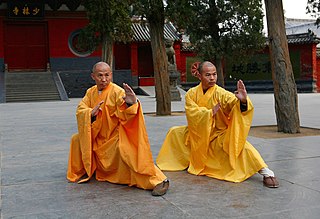 W
WCao Ji Wu, (1662-1722), was a Chinese master of the internal martial art of Xinyi, precursor of Xingyi. According to accepted theory, he is probably the second lineage holder of the art. Other, less credible, theories consider Bodhidharma or Yue Fei as the originators of the style.
 W
WChen Bingkun, ,(1868 – September 1927) was born in 1868 in Liujiang, Guangxi, China. A general in the late Qing Period, he was commander of the 1st Division of the Guangxi Provincial Army. As a supporter of the Old Guangxi Clique he became the military governor of Guangxi from 1916-17, civil governor of Guangxi in 1916 and military governor of Guangdong in 1917. With Lu Rongting he opposed the southern government led by Sun Yat-sen. In 1920 Chen Jiongming, acting for Sun Yat-sen, pushed them out of Guangdong in the First Ao-Gui War. In 1921 he invaded Guangxi, igniting the Second Ao-Gui War. Lu sent two wings of his army, one led by Tan Haoming and the other under Shen Hongying, into Guangdong where they drove back the Cantonese and occupied Qinzhou and Lianzhou. However, the center at Wuzhou, commanded by Chen Binghun, collapsed and Chen Jiongming drove up the rivers while allies came in from the north, forcing Lu Rongting to step down in July 1921. By August Chen had occupied Nanning, defeating the Old Guangxi clique and Chen Binghun. Chen died in September 1927.
 W
WDong Fuxiang (1839–1908), courtesy name Xingwu (星五), was a Chinese military general who lived in the late Qing dynasty. He was born in the Western Chinese province of Gansu. He commanded an army of Hui soldiers, which included the later Ma clique generals Ma Anliang and Ma Fuxiang. According to the Western calendar, his birth date is in 1839.
 W
WDorgon, also Prince Rui, was a Manchu prince and regent of the early Qing dynasty. Born in the House of Aisin-Gioro as the 14th son of Nurhaci, Dorgon started his career in military campaigns against the Ming dynasty, Mongols and Koreans during the reign of his eighth brother, Hong Taiji, who succeeded their father.
 W
WDuan Zhigui was a Chinese general. Born in Hefei, Anhui, he attained the post of Heilongjiang governor in the late Qing dynasty and between 1912-13 was governor of Chahar and the military governor of Hubei between 1914–15, as well as military and civil governor of Fengtian in 1915-16.
 W
WFuheng, courtesy name Chunhe (春和), was a Qing Dynasty official from the Manchu Fuca clan and the Bordered Yellow Banner of the Eight Banners, and was a younger brother of the Empress Xiaoxianchun. He served as a senior minister at the court of his brother-in-law, the Qianlong Emperor from the 1750s to his death in 1770. He is best known for leading the Qing troops in the fourth and last invasion of Burma in the Sino-Burmese War (1765–1769).
 W
WFuk'anggan, courtesy name Yaolin, was a Manchu noble and general of the Qing Dynasty. He was from the Fuca clan and the Bordered Yellow Banner of the Eight Banners.
 W
WMa Fuxiang was a Chinese military and political leader spanning the Qing Dynasty through the early Republic of China and illustrated the power of family, the role of religious affiliations and the interaction of Inner Asian China and the national government of China. He was a prominent Muslim warlord in northwest China. Ma Fuxiang originally served under Dong Fuxiang, like other Ma Clique Muslim warlords such as Ma Anliang.
 W
WZhang Gaoyuan was a general of the Huai Army in the late Qing Dynasty.
 W
WGe Yunfei was a Chinese general of the Qing dynasty. He served in the First Opium War and died during the British capture of Chusan.
 W
WGeng Jimao or Keng Chi-mao was a Chinese prince and military leader, inheriting the title of "Jingnan Prince" from his father Geng Zhongming, along with his lands, and passing it on, in his turn to his son Geng Jingzhong.
 W
WGeng Jingzhong was a powerful military commander of the early Qing dynasty. He inherited the title of "King/Prince of Jingnan" (靖南王) from his father Geng Jimao, who had inherited it from Jingzhong's grandfather Geng Zhongming.
 W
WProsper Marie Giquel was a French naval officer who played an important role in the modernization of 19th century China. His Chinese name was 日意格.
 W
WJiang Guiti was a Chinese general who served under Song Qing in the suppression of the Taiping and Nian rebels and later against the Empire of Japan.
 W
WJiang Chaozong was a general in the late Empire of China and an acting Premier of the Republic of China in 1917.
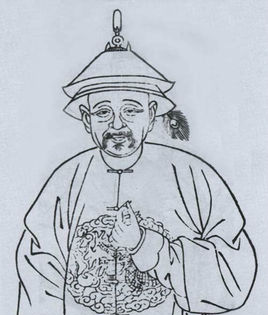 W
WLi Shuaitai was a military commander of the early Qing Dynasty. He served as the Viceroy of Liangguang between 1653 and 1656, then as the Viceroy of Minzhe from 1656 to its partition in 1658, after which he continued as Viceroy of Fujian until 1664.
 W
WLiu Xianshi was a Chinese general of the Late Qing dynasty and early Republican period. Initially supporting Yuan Shikai and his declaration of the Empire of China, Liu joined Cai E and Tang Jiyao a month after the start of the National Protection War in rebelling against Yuan.
 W
WLiu Yongfu (1837–1917) was a Chinese warlord and commander of the celebrated Black Flag Army. Liu won fame as a Chinese patriot fighting against the French Empire in northern Vietnam (Tonkin) in the 1870s and early 1880s. During the Sino-French War he established a close friendship with the Chinese statesman and general Tang Jingsong, and in 1895 he helped Tang organise resistance to the Japanese invasion of Taiwan. He succeeded Tang as the second and last president of the short-lived Republic of Formosa.
 W
WLong Jiguang (龍濟光) (1867–1925) was an ethnic Hani Chinese general of the late Qing and early Republican period of China.
 W
WLong Jinguang was an ethnic Hani Chinese general of the late Qing and early Republican period of China. He was the older brother of Chinese general Long Jiguang. Both brothers supported Yuan Shikai's restoration of the monarchy.
 W
WLuo Bingzhang (simplified Chinese: 骆秉章; traditional Chinese: 駱秉章, courtesy names Yumen 籲門 and Ruzhai 儒齋; Posthumous name: Wenzhong 文忠; was an eminent Han Chinese official, military general, and devout Confucian scholar of the late Qing Dynasty in China.
 W
WMa Anliang was a Hui born in Hezhou, Gansu, China. He became a general in the Qing dynasty army, and of the Republic of China. His father was Ma Zhan'ao, and his younger brothers were Ma Guoliang and Ma Suiliang 馬遂良. Ma was educated in Chinese and Islamic education. His Muslim name was Abdul Majid 阿卜都里默直底.
 W
WMa Lin was the governor of Qinghai 1931–38 and the brother of Ma Qi. A Muslim born in 1873, Linxia County, Gansu, he mainly acceded to the posts of his brother, being general of southeastern Gansu province, as well as councillor of the Qinghai provincial government and acting head of the Construction Bureau of Qinghai province. His father was Ma Haiyan.
 W
WMa Qi was a Chinese Muslim General in early 20th-century China.
 W
WMa Yukun was a Chinese army general that primarily served the Huai Army and the Resolute Army and his most notable role was during the Boxer Rebellion.
 W
WGeneral William Mesny was an adventurer and writer born on the island of Jersey but spent most of his childhood in Alderney, the family home of the Mesnys. He was the eldest of three children of William Mesny and Mary Rachel Nicolle.
 W
WJohann Wilhelm Normann Munthe was a Norwegian military officer and art collector.
 W
WNian Gengyao, courtesy name Lianggong, was a Chinese military commander of the Qing dynasty. He was born a member of the Han Chinese Bordered Yellow Banner and had extensive military experience on the western frontier of the Qing Empire. Nian became commander-in-chief of the Qing armies in the northwest; and helped to incorporate the region of what is now Qinghai into the Qing Empire.
 W
WNie Shicheng was a Chinese general who served the Imperial government during the Boxer Rebellion. Rising from obscure origins from Hefei, Anhui Province, in the early 1850s, Nie Shicheng managed to pass the county examinations for bureaucratic positions, but due to the Taiping rebellion he was forced to abandon a bureaucratic career and become a soldier.
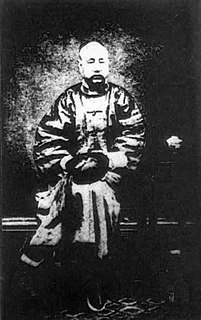 W
WSengge Rinchen or Senggelinqin was a Mongol nobleman and general who served under the Qing dynasty during the reigns of the Daoguang, Xianfeng and Tongzhi emperors. He is best known for his role at the Battle of Taku Forts and at the Battle of Baliqiao during the Second Opium War and his contributions in helping the Qing Empire suppress the Taiping and Nian rebellions.
 W
WShang Kexi was a Chinese general of the Ming and Qing Dynasties. His family had migrated to Liaodong in 1576 and his father, Shang Xueli, served in the army guarding the northeast frontier. As his father did, Shang Kexi joined the army and guarded the frontier against the attack of the Jurchens. Shang was described to be a brave and resourceful man who was skilful at mounted archery and capable in military matters.
 W
WShang Zhixin was a major figure in the early Qing Dynasty, known for his role in the Revolt of the Three Feudatories. He was Prince of Pingnan, inheriting his position from his father, the surrendered Ming Dynasty general Shang Kexi.
 W
WShen Baozhen (1820–1879), formerly romanized Shen Pao-chen, was an official during the Qing dynasty.
 W
WSong Qing (1820–1902), courtesy name Zhusan, was a Chinese general who served the Imperial government during the First Sino-Japanese War and in the Boxer Rebellion.
 W
WTang Jingsong was a Chinese general and statesman. He commanded the Yunnan Army in the Sino-French War, and made an important contribution to Qing dynasty China's military effort in Tonkin by persuading the Black Flag leader Liu Yongfu to serve under Chinese command. His intelligent, though ultimately unsuccessful, direction of the Siege of Tuyên Quang was widely praised. He later became governor of the Chinese province of Taiwan. Following China's cession of Taiwan to Japan at the end of the First Sino-Japanese War (1894–1895) he became president of the short-lived Republic of Formosa.
 W
WWang Zhanyuan was a Chinese general of the Warlord Era of China's Republican period, whose power base was in Hubei province.
 W
WWang Yirong was a director of the Chinese Imperial Academy, best known as the first to recognize that the symbols inscribed on oracle bones were an early form of Chinese writing. His work on the oracle bone script was curtailed when he accepted a local command during the Boxer Rebellion, despite his belief that the cause was futile. When an international force occupied Beijing in August 1900, Wang committed suicide, together with his wife and daughter-in-law. A museum devoted to Wang is located in his birthplace of Yantai, Shandong.
 W
WFrederick Townsend Ward was an American sailor and soldier of fortune known for his military service in Imperial China during the Taiping Rebellion.
 W
WYin Chang or In-ch'ang was a military official, ambassador to Germany, and educational reformer in the Qing Dynasty and the Republic of China. He was appointed the nation's first Minister of War in the late Qing Dynasty. During the Republic he served as the military Chief of Staff for all of the subsequent presidents in the Beiyang Government. He was ethnic Manchu, and his family belonged to the Plain White Banner Clan of the Manchu Military Organization (滿洲正白旗); he held the title of Prince of that clan; at court he was addressed as Wu-lou.
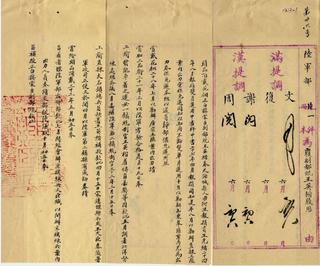 W
WWang Yingkai, whose courtesy name was Shaochen (紹宸), was a Chinese general in the Beiyang Army and first rank official of the late Qing dynasty, who served as the Vice President of the Ministry of War and Vice-Commander-in-Chief of the Plain White Banner. Wang graduated from the Tianjin Military Academy (天津武備學堂), also known as Beiyang Wubei Xuetang (北洋武備學堂), and fought with distinction in the First Sino-Japanese War. After China lost the war, he joined the Beiyang Army established by Yuan Shikai and became one of leading commanders of the army. However, during subsequent political struggles he sided with the court party against Yuan. Sun Chuanfang, who later became one of the most important warlords in the early Republican years, was his brother-in-law and protégée. Wang Yingkai died in Beijing in 1908.
 W
WYuan Shikai was a Chinese military and government official who rose to power during the late Qing dynasty and eventually ended the Qing dynasty rule of China in 1912, later becoming the Emperor of the Empire of China (1915–1916). He first tried to save the dynasty with a number of modernization projects including bureaucratic, fiscal, judicial, educational, and other reforms, despite playing a key part in the failure of the Hundred Days' Reform. He established the first modern army and a more efficient provincial government in North China in the last years of the Qing dynasty before forcing the abdication of the Xuantong Emperor, the last monarch of the Qing dynasty, in 1912. Through negotiation, he became the first President of the Republic of China in 1912. This army and bureaucratic control were the foundation of his autocratic rule. He was frustrated in a short-lived attempt to restore hereditary monarchy in China, with himself as the Hongxian Emperor. His death shortly after his abdication led to the fragmentation of the Chinese political system and the end of the Beiyang government as China's central authority.
 W
WYunti, born Yinzhen and also known as Yinti before 1722, formally known as Prince Xun, was a Manchu prince and military general of the Qing dynasty.
 W
WZeng Fengnian (Chinese: 曾逢年; 1809-1885) was a late Qing military figure from Jieshi, Lufeng, Guangdong. In 1845 he was appointed commander of the Nan'ao Subdistrict and in 1863 was given the peacock plume for his successful suppression of local bandits.
 W
WZeng Guofan, Marquis Yiyong, birth name Zeng Zicheng, courtesy name Bohan, was a Chinese statesman and military general of the late Qing dynasty. He is best known for raising and organizing the Xiang Army to aid the Qing military in suppressing the Taiping Rebellion and restoring the stability of the Qing Empire. Along with other prominent figures such as Zuo Zongtang and Li Hongzhang of his time, Zeng set the scene for the Tongzhi Restoration, an attempt to arrest the decline of the Qing dynasty. Zeng was known for his strategic perception, administrative skill and noble personality on Confucian practice, but also for his ruthlessness in repressing rebellions.
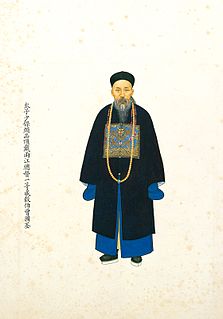 W
WZeng Guoquan, courtesy name Yuanfu, art name Shuchun, was a Chinese official and military leader of the late Qing dynasty. He was the ninth brother of Zeng Guofan, a prominent statesman and general, and a descendant of the philosopher Zengzi. He served in the Xiang Army, a standing military force organised by his brother to counter the Taiping rebels, and was nicknamed "Ninth Marshal" (九帥). He was known for his expertise in siege warfare, particularly the use of trenches, hence he was also nicknamed "Zeng the Iron Container" (曾鐵桶). During the conquest of Tianjing (Nanjing), the capital of the Taiping Heavenly Kingdom, Zeng was notorious for condoning massacres of the city populace, which resulted in him being called "Zeng the Butcher" (曾屠戶).
 W
WZhang Xiluan (1843–1922) was a Chinese general of the late Qing Dynasty.
 W
WZhang Xun, courtesy name Shaoxuan (少軒), art name Songshoulaoren (松壽老人), nickname bianshuai was a Qing and Republic of China's loyalist general who attempted to restore the abdicated emperor Puyi in the Manchu Restoration of 1917. He also supported Yuan Shikai during his time as president.
 W
WZhao Ti (1871–1933) was a Chinese general of the late Qing and early Republican period of China. In 1920, he was military governor of Henan.
 W
WZheng Shiqi, was a Chinese General, military governor of Shandong (1923–25) and Anhui (1925).
 W
WZuo Zongtang, Marquis Kejing, sometimes referred to as General Tso, was a Chinese statesman and military leader of the late Qing dynasty.